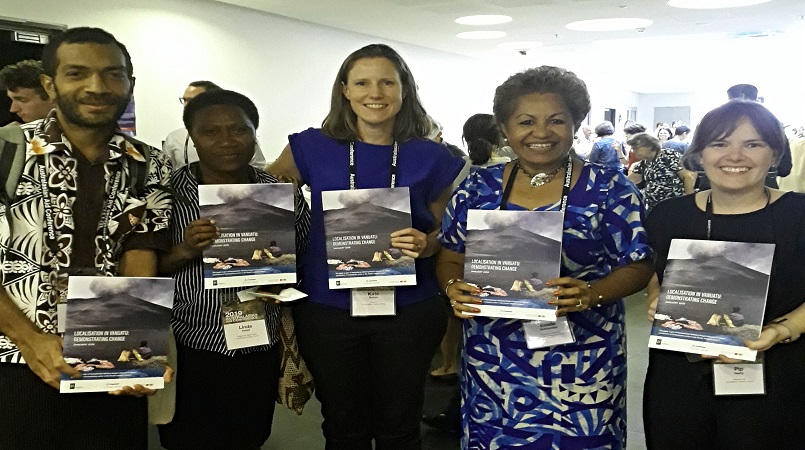
There is a need for a strong coalition of humanitarian actors, including governments to demand speedy action on Localisation of Humanitarian aid, resourcing of national and local leadership and more equitable partnerships.
At the same time, Localisation needs to link to the Framework for Resilient Development in the Pacific.
This was highlighted at the Australasian Aid Conference, in Canberra last week by a panel session led by Pacific Islands Association of Non-Governmental Organisation (PIANGO) Executive Director Emele Duituturaga.
The discussion titled “Tracking Progress on World Humanitarian Summit Commitments in the Pacific” reflected on research that has been done in the humanitarian community and what the evidence is saying.
Panelists included Linda Kenni of HAG, Josaia Jirauni of PIANGO, Fiona Tarpey of Australian Red Cross and Grace Asten of Anglican Overseas Aid. Panelists shared how their respective organisations were addressing localisation and lessons learned from TC Pam, TC Winston, TC Gita and the Ambae response in Vanuatu.
Led by the Vanuatu Association of NGOs (VANGO), PIANGO and Humanitarian Advisory Group (HAG), a baseline measurement of Localisation in Vanuatu was presented at the conference.
“Localisation has been well discussed within the International and Pacific NGO sector, but Pacific governments still have to be engaged in the Localisation discourse to recognise the role of national and local NGOs,” Ms Duituturaga said.
Ms Duituturaga said it was interesting to note in the Vanuatu baseline that although some local NGOs had met donor required standards, however they still did not receive direct funding which is still channeled to INGOs who then engage local NGOs as their implementers.
The humanitarian sector is currently developing ways to measure progress on Localisation following the commitments made at the 2016 World Humanitarian Summit.
“Generating an evidence base on Localisation is important in order to demonstrate what change is happening and the impact it is having,” Ms Duituturaga added.
“In the Pacific where 80 per cent of its population are rural based, the first and the last response is always the local response. But the resourcing is still centralized; partnerships are not equitable; there is weak coordination and lack of complimentarity. These are key issues to be addressed especially at the country levels.”
PIANGO is taking a lead role and will be looking at how they can raise this topic at the upcoming Inaugural Pacific Resilience Meeting in April.
“We need to look at how we can contribute as a strong pull factor for Localisation that it is aligned to the Charter of Change and the Grand Bargain commitments made at the 2016 World Humanitarian Summit.
Photo supplied
